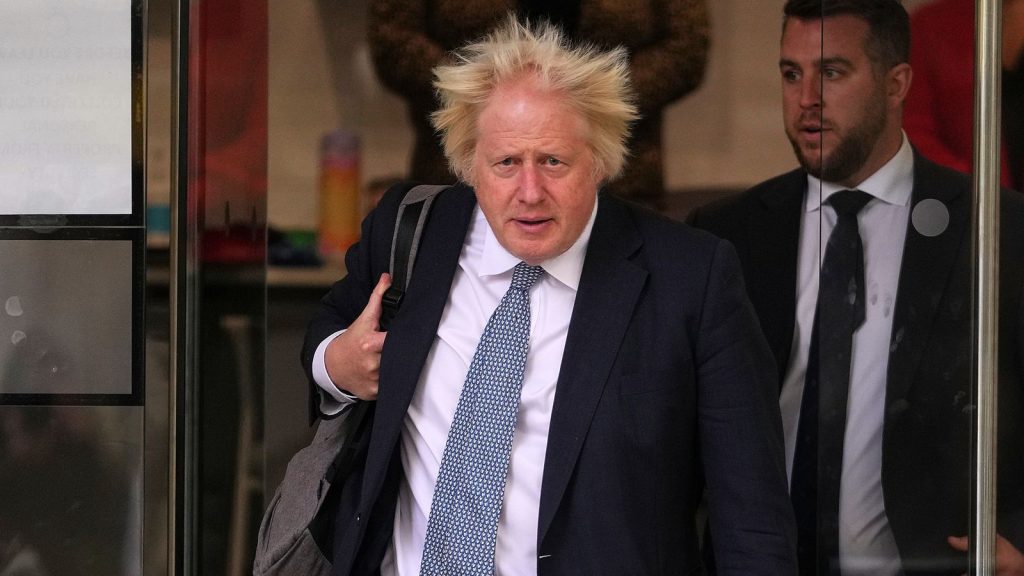Children “paid a huge price” to protect the rest of society during lockdown and school closures should only be a “last resort” in future pandemics, Boris Johnson has said.
Giving evidence at the UK COVID-19 Inquiry, the former prime minister said he wished another solution could have been found to shutting down classrooms but predictions about the spread of the virus at the time were “really grim”.
Politics Live: Johnson left in ‘homicidal mood’ after exam result fiasco
Schools across the UK were closed from 23 March 2020 except for children of essential workers and vulnerable pupils, reopening again in phases over the summer before shutting again in January 2021.
Mr Johnson, the prime minister at the time, said he had “a personal horror” of closing schools because of the consequences it would have on young people.
And looking back, he said he does not know if the “nightmare idea” saved lives in proportion to the damage it caused.
He told the inquiry: “Given the huge damage the closures have done, given the loss of life chances they have caused, you have got to ask yourself now whether we could have found other ways in reducing the budget of risk from COVID.
“If they were 20% of the R (risk), was there a way of doing it without school closures? The advice I was getting was absolutely not, you have got to do it, and that’s how it seemed to me then.”
He added: “Was there another thing we could have done? Was there another shot we could have played? I don’t know the answer to that, nor can I answer… but the predictions were really grim.”
Mr Johnson faced a morning of questions as part of Module 8 of the inquiry, which is looking at the impact of the pandemic on children and young people.
Protesters for charity Long Covid Kids gathered outside Dorland House, where the hearings are being held, and shouted “shame on you” as Mr Johnson left the building.
Dan Paskins, executive director of UK Impact at Save the Children UK, said the actions of those in power during the pandemic “damaged a generation of children” and “no amount of regret will undo the harm that has been done”.
Mr Johnson denied a lack of planning when it came to closing schools, saying it was “obvious” this needed to be considered as part of lockdown measures as the virus spread across the globe in early 2020.
One line of questioning regarded how much say the Department for Education (DfE) had around the cabinet table, after former education secretary Gavin Williamson said in his own evidence last week that Mr Johnson “chose the NHS over children” and “many mistakes were made”.
Asked whether children’s interests were sufficiently well represented in decision making, Mr Johnson said he felt at the time that children were paying “a huge huge price to protect the rest of society” and “I wish we could have found another solution”.
Read More:
The realities of the COVID classroom that Boris Johnson will need to explain
Future lockdowns ‘should be last resort’
He also said that rules on social distancing “probably did go too far” in terms of their impact on children and “we could have found a way of exempting” them.
He added: “Hopefully this thing never happens again, but if we have to do anything like this again, I think we’re really going to have to consider the whole NPI (non-pharmaceutical intervention) system, lockdowns, whether we want to go down that route at all, particularly whether we want to close schools.
“Because it really should be a measure of last resort in the budget of allowances that you speak of.”
The other topic that was discussed at length was the 2020 exam results fiasco – when teachers were asked to supply estimated grades and rankings of pupils in comparison to their peers before an algorithm was used to finalise results.
The algorithm was intended to prevent grade inflation but saw 40% of predicted results downgraded, resulting in public outcry and a government U-turn.
The hearing was shown WhatsApp messages from the time between Mr Johnson and his then adviser Dominic Cummings, in which he described being in a “homicidal mood” because of the scandal and considered firing Mr Williamson.
Mr Johnson acknowledged the algorithm was a “disaster” but said it was “plainly not easy to come up with a substitute system” after exams were cancelled.
And while calm throughout most of the hearing – he appeared rattled as he defended the process.
“All I would say is – you try coming up with a system to give a fair exam result for people when they can’t sit exams. It’s not easy. OK?”




